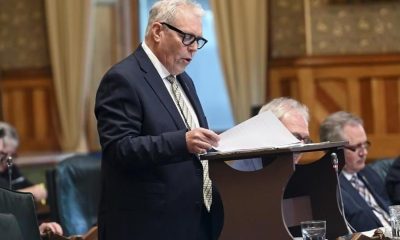It’s Wednesday, February 26. In today’s newsletter: A sixty trillion dollar man. Plus: What nonvoters want.
*
« TODAY IN POLITICS »
(Matt Rourke / AP)
He has a (very pricy) plan for that.
Perhaps for the first time on a debate stage, Bernie Sanders showed “the first sign of uneasiness,” and was thrust into “moments where he was not 100 percent sure of what his rebuttal was going to be,” one former presidential-campaign communications director told our analyst Ron Brownstein.
One potential weakness—still left relatively untouched by his challengers—is the cost of his ambitious agenda. The numbers aren’t quite adding up, Ron writes:
Until now, Sanders has responded to questions about his agenda’s cost by focusing only on his vision for Medicare for All, insisting that most Americans would spend less than they do now—even if their taxes are increased—because the plan would eliminate their insurance premiums, co-payments, and deductibles.
The document that Sanders handed [CNN moderator Chris] Cuomo on Monday represents his most complete attempt to explain how he would cover the bill for his entire agenda. But critics quickly noted that it falls well short of the full price tag for his plans—and almost certainly overstates the funds they would generate.
*
« IDEAS AND ARGUMENTS »
(Jonathan Ernst / Reuters)
1. “With a loyalist as acting director of national intelligence, the official line on issues like Russian election meddling could bend closer to the president’s.”
The president’s recent appointment of a replacement acting director of national intelligence, Richard Grenell, who now heads the same office that published the 2017 report on Russian meddling, raises a question, Mike Giglio writes: “Will Trump finally seek to muzzle his spies as he pushes to control the narrative in his reelection campaign?”
2. “The candidates’ attempts at moral clarity got muddled when conversation turned to the trade-offs inherent in actually conducting American statecraft.”
Democrats running to displace the current president in 2020 are eager to emphasize that they, unlike Trump, won’t be so cozy with autocrats, and will champion democratic forces around the world. But during the latest debate in South Carolina, that narrative crumbled, Uri Friedman writes.
3. “One of the many issues at stake in this year’s election is the future of the Court … and the election will also help to determine the Court’s approach to the poor.”
What’s going on with the Supreme Court? Its empathy for the poor has gradually been replaced by hostility, the writer Adam Cohen argues, tracing the Court’s ruling on cases over the last half century.
4. “Boosting turnout won’t necessarily help the most progressive candidate.”
One of Sanders’s major selling points—that he’s uniquely positioned to improve voter turnout in the disaffected slice of the electorate—isn’t as clear a benefit as it might seem, the political scientist Yascha Mounk argues. Nonvoters are far less progressive than is commonly believed.
*
« EVENING READ »
(BETTMANN / GETTY / KATIE MARTIN / THE ATLANTIC)
Why America Radicalizes Brits
It seems that a little time across the proverbial pond changes people. Our London-based writer Tom McTague observes:
The idea of America has always been political: the wealth and opportunity as some see it, the injustice and individualism as others prefer. With Brexit this has only become more pronounced. The U.S. has been held up by one side of the argument as an opportunity to grasp, and by the other as the danger of what might become. To ardent leavers, it offers the hope of free trade without constitutional entanglement; to many remainers, it means subservience to a greater power, chlorinated chicken, and privatized health care.
*
Today’s newsletter was written by Shan Wang, who oversees newsletters.
You can reply directly to this newsletter with questions or comments, or send a note to politicsdaily@theatlantic.com.
Your support makes our journalism possible. Subscribe here.
We want to hear what you think about this article. Submit a letter to the editor or write to letters@theatlantic.com.
